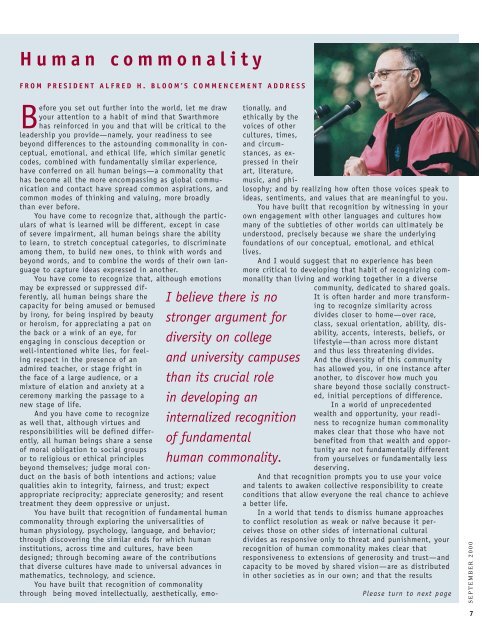SWARTHMORE
Swarthmore College Bulletin (September 2000) - ITS
Swarthmore College Bulletin (September 2000) - ITS
- No tags were found...
Create successful ePaper yourself
Turn your PDF publications into a flip-book with our unique Google optimized e-Paper software.
H u m a nc o m m o n a l i t yF R O M P R E S I D E N T A L F R E D H . B L O O M ’ S C O M M E N C E M E N T A D D R E S SBefore you set out further into the world, let me drawyour attention to a habit of mind that Swarthmorehas reinforced in you and that will be critical to theleadership you provide—namely, your readiness to seebeyond differences to the astounding commonality in conceptual,emotional, and ethical life, which similar geneticcodes, combined with fundamentally similar experience,have conferred on all human beings—a commonality thathas become all the more encompassing as global communicationand contact have spread common aspirations, andcommon modes of thinking and valuing, more broadlythan ever before.You have come to recognize that, although the particularsof what is learned will be different, except in caseof severe impairment, all human beings share the abilityto learn, to stretch conceptual categories, to discriminateamong them, to build new ones, to think with words andbeyond words, and to combine the words of their own languageto capture ideas expressed in another.You have come to recognize that, although emotionsmay be expressed or suppressed differently,all human beings share thecapacity for being amused or bemusedby irony, for being inspired by beautyor heroism, for appreciating a pat onthe back or a wink of an eye, forengaging in conscious deception orwell-intentioned white lies, for feelingrespect in the presence of anadmired teacher, or stage fright inthe face of a large audience, or amixture of elation and anxiety at aceremony marking the passage to anew stage of life.And you have come to recognizeas well that, although virtues andresponsibilities will be defined differently,all human beings share a senseof moral obligation to social groupsor to religious or ethical principlesbeyond themselves; judge moral conducton the basis of both intentions and actions; valuequalities akin to integrity, fairness, and trust; expectappropriate reciprocity; appreciate generosity; and resenttreatment they deem oppressive or unjust.You have built that recognition of fundamental humancommonality through exploring the universalities ofhuman physiology, psychology, language, and behavior;through discovering the similar ends for which humaninstitutions, across time and cultures, have beendesigned; through becoming aware of the contributionsthat diverse cultures have made to universal advances inmathematics, technology, and science.I believe there is nostronger argument fordiversity on collegeand university campusesthan its crucial rolein developing aninternalized recognitionof fundamentalhuman commonality.You have built that recognition of commonalitythrough being moved intellectually, aesthetically, emotionally,andethically by thevoices of othercultures, times,and circumstances,as expressedin theirart, literature,music, and philosophy;and by realizing how often those voices speak toideas, sentiments, and values that are meaningful to you.You have built that recognition by witnessing in yourown engagement with other languages and cultures howmany of the subtleties of other worlds can ultimately beunderstood, precisely because we share the underlyingfoundations of our conceptual, emotional, and ethicallives.And I would suggest that no experience has beenmore critical to developing that habit of recognizing commonalitythan living and working together in a diversecommunity, dedicated to shared goals.It is often harder and more transformingto recognize similarity acrossdivides closer to home—over race,class, sexual orientation, ability, disability,accents, interests, beliefs, orlifestyle—than across more distantand thus less threatening divides.And the diversity of this communityhas allowed you, in one instance afteranother, to discover how much youshare beyond those socially constructed,initial perceptions of difference.In a world of unprecedentedwealth and opportunity, your readinessto recognize human commonalitymakes clear that those who have notbenefited from that wealth and opportunityare not fundamentally differentfrom yourselves or fundamentally lessdeserving.And that recognition prompts you to use your voiceand talents to awaken collective responsibility to createconditions that allow everyone the real chance to achievea better life.In a world that tends to dismiss humane approachesto conflict resolution as weak or naïve because it perceivesthose on other sides of international culturaldivides as responsive only to threat and punishment, yourrecognition of human commonality makes clear thatresponsiveness to extensions of generosity and trust—andcapacity to be moved by shared vision—are as distributedin other societies as in our own; and that the resultsPlease turn to next pageS E P T E M B E R 2 0 0 07
















